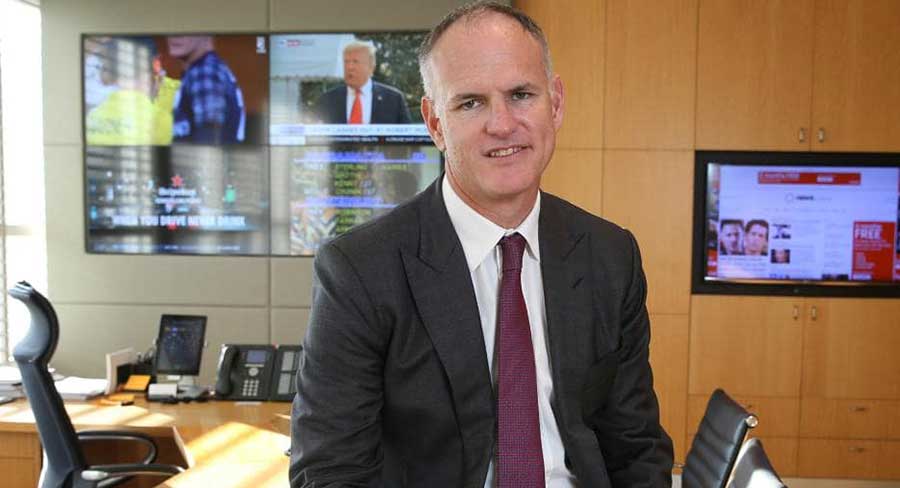Reaction from publishers this morning has been swift following the ACCC’s release of a draft code aimed at addressing acute bargaining power imbalances between Australian news businesses and Google and Facebook.
See also: Australian news media to negotiate payment with major digital platforms
Michael Miller: News Corp Australia
Statement from News Corp Australasia executive chairman Michael Miller:
“While other countries are talking about the tech giants’ unfair and damaging behaviour, the Australian Government and the ACCC are taking world-first action. I congratulate them for their leadership.
“The tech platforms’ days of free-riding on other peoples’ content are ending. They derive immense benefit from using news content created by others and it is time for them to stop denying this fundamental truth.
“The ACCC’s draft Code of Conduct is a watershed moment; it can force the platforms to play by the same rules other companies willingly follow and it ultimately means they will no longer be able to use their power to walk away from negotiations with news creators.
“This code has the potential to benefit all Australians by securing the future for the people and companies who serve real communities with real news.
“I look forward to entering into negotiations with the platforms as soon as possible.”
Joan Warner: Commercial Radio Australia
Commercial Radio Australia said the release of the Australian Competition and Consumer Commission’s draft mandatory code of conduct to govern agreements between tech giants and Australian media companies is “an important step forward”.
“The release of the draft code is an important step towards fairer negotiations between the tech giants and Australian media companies,” said Joan Warner, chief executive officer of industry body Commercial Radio Australia.
“The draft code has the potential to address some of the serious issues raised by the commercial radio industry, such as revenue sharing and greater transparency of algorithms.
“We will carefully examine the details and the implications for broadcasters during the consultation process.
“Given the difficult conditions that local media are currently trading in, it’s vital that broadcasters can negotiate fairer partnerships with Google and Facebook as soon as possible, and we’d like to see those in place by the end of the year.”
Marcus Strom: Media, Entertainment & Arts Alliance
Australia’s union for journalists, MEAA, has welcomed the draft bargaining code on digital platforms released today by the Australian Competition and Consumer Commission. It claims it is an overdue step to force Google and Facebook to compensate media organisations for content they have been using for free.
“For nearly two decades Google and Facebook have built enormous fortunes off the back of aggregating content that others have made and others have paid for. It is a business model that has literally destroyed newsrooms around the world,” said MEAA Media president Marcus Strom. “It is time that free lunch comes to an end.”
MEAA welcomed the decision to proceed to a mandatory code in response to the intransigence of the digital platforms, but concerns remain about whether the compensation generated will also be used to fund a sustainable future for public interest journalism in Australia, how smaller outlets and start-ups will be able to access it and whether distributed funds will benefit the ultimate creators of value, our journalist members, including freelance producers of media news.
Strom said: “MEAA and many media organisations have been calling for recognition of the compensation issue for many years. Finally, those calls have been heard – albeit after great resistance from the digital platforms.
“This draft code is a great first step. It is underpinned by the ACCC’s acknowledgement that ‘a strong and independent media landscape is essential to a well-functioning democracy’. It acknowledges the clear bargaining imbalance between the digital behemoths and Australian news media companies.
“However, there are still issues that must be addressed and included in the code. We are concerned, for instance, that many of the new regional media outlets formed this year during the COVID-19 crisis could be excluded – and these innovative outlets are the organisations that need the most support,” Strom said.
“Since January 2019 more than 200 broadcast and print newsrooms have closed temporarily or for good. So far in 2020, Covid-19 has contributed to the suspension or permanent closure of more than 100 newspaper mastheads, many of them in regional Australia. We estimate that the Australian media is on track to lose a further 1000 editorial jobs this year alone.
“The closure of so many regional newspapers in recent months demonstrates how precarious the battle for survival is for smaller media outlets. Regional media should benefit from the proposed code. We will need to review this issue in consultation with regional media outlets and our members,” Strom added.
Nine Entertainment Co
A Nine spokesperson said: “Nine welcomes the fact that the ACCC and the Government continue to push the agenda forward by recognising the importance of the regulatory and bargaining imbalances that exist between Australian media organisations and the dominant global digital platforms. We are confident that following this important step in the process we are positioned to achieve an outcome which will ensure significant long-term benefits to our news organisation.”
